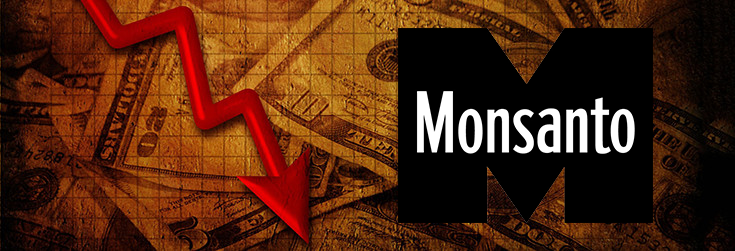Is Monsanto’s Worst Fear Coming True?

As major food retailers decide to finally give the public what they truly want – organic, non-GMO food – is Monsanto’s business model in jeopardy? Is Monsanto’s worst fear coming true? That huge companies like Coca-Cola, Kraft, McDonald’s and others will follow the lead of the Chipotle restaurant chain and Campbell’s Soup to make their product lines either GMO-free or at least labeled as containing genetically modified ingredients?
You can tell that Chipotle’s decision to go GMO-free posed a massive sea-change for the biotech industry – not because the chain is so big, but because of the way established media responded to the decision. Jonathan Latham, Ph.D., notes that:
“Chipotle was called irresponsible, anti-science, irrational, and much more by the Washington Post, Time Magazine, the Chicago Tribune, the LA Times, and many others. A business deciding to give consumers what they want was surely never so contentious.”
Campbell’s, General Mills, Others Move to GMO Labeling for Soups

Then there’s Campbell’s, General Mills, ConAgra Foods, and others that have make recent decisions to either support GMO labeling or label their GM products. Though the companies aren’t saying they’ll stop using GM ingredients, the bow to people’s desire to know what’s in their food marks another seismic shift for the biotech industry.
Campbell’s CEO, Denise Morrison, told the company’s employees:
“We are operating with a “Consumer First” mindset. We put the consumer at the center of everything we do. That’s how we’ve built trust for nearly 150 years. We have always believed that consumers have the right to know what’s in their food. GMO has evolved to be a top consumer food issue reaching a critical mass of 92% of consumers in favor of putting it on the label.”
From ConAgra:

McDonald’s Will Not Use GMO Potatoes

Although the media lynching of Chipotle could be a deterrent, McDonald’s also recently said that it would not use Simplot’s “Innate” GMO potatoes due to consumer concerns. When the international company made the announcement, they were flooded with comments like this one from Carol Clement:
“Good call. Everyone knows a french fry’s flavor comes from its unmodified ACTGCGCATCTTGCAATATCGAGCA DNA sequence.”
These occurrences show a crack in the “GMOs can feed the world” veneer that agribusiness has been selling the public, farmers, and multinational companies who have been drinking the Kool-Aid provided by corporations like Monsanto. Agribusiness sees GMOs as central to their business future, but stores and restaurants see that they must please their customers, who increasingly do not want GMOs.
Companies That Don’t Sell Organics Are Losing Business

Other companies have been going along with their buddies in agribusiness, but you can only root for the home team for so long. When you start losing billions due to the increased demand for organic, non-GMO food, then you have to start questioning the business model of Monsanto (and Dow, Syngenta, etc.).
Perhaps at one point these food companies thought the public would be on board with GMOs if, as Hillary Clinton has insinuated, they were just talked about differently and not ‘demonized.’ But the science is out, and consumers are savvier than these massive corporations would like.
Over the last 5 years, GMOs have come under increasing scrutiny in the U.S., resulting in a growing demand for GMO-free products. Sellers of food brands can’t afford to displease their customers.
Companies that don’t pay attention to consumer demand will likely die like dinosaurs in a cataclysm. This is why McDonald’s is already moving to healthier food choices on their menu, and chains like Panera have removed the artificial flavors from their offerings. GMOs may have been good for Big Food even five years ago, but they spell a certain demise NOW.
For agribusiness giants like Monsanto, DuPont, Bayer and Syngenta that have backed GMOs, the race to be GMO-free is the ultimate horror. Yes, Monsanto’s worst nightmare is coming true.
As GMO crop technologies keep growing but become increasingly less popular, you can bet that consumers will continue to demand non-GMO, organic food. Even the USDA has just reported on its blog that organic food sales are increasing.
The Nutrition Business Journal reports annual growth in the nation’s organic food sales has generally exceeded 10 percent since the downturn in the American economy in 2008. U.S. organic food sales approached an estimated $37 billion in 2015, up 12 percent from the previous year. And it won’t stop.
Big Food Executives React to Demand for Organic

Big Food companies can continue to stick their heads in the ground when it comes to GMOs, or act like Chipotle and give people organic food that isn’t full of pesticides and questionable DNA strains. Monsanto’s lies might have fooled the CEOs for some time, but after looking at earnings like those reported in these headlines, something’s got to give:
Or how about Richard Smucker’s recent comments as major packaged-food companies lost $4 billion in market share while their customers turned to organic alternatives:
“We look at our business and say, ‘How can we remake ourselves?’”
An executive at ConAgra, owner of 29 food brands that bring in $100 million apiece in annual retail sales, lamented to a Credit Suisse analyst that “big” had become “bad.”
Yet another executive, Denise Morrison, CEO of Campbell’s Co., stated an apparently widespread industry fear at the Consumer Analyst Group of New York 2016 conference: The publics “mounting distrust of Big Food” could drive shoppers away from companies like hers for good:
“We understand that increasing numbers of consumers are seeking authentic, genuine food experiences, and we know that they are skeptical of the ability of large, long-established food companies to deliver them.”
Hmm, might that be because the average American doesn’t think “mmm, mmm good” should include genetically modified ingredients? The gig is up, and Big Food is finally getting it.
